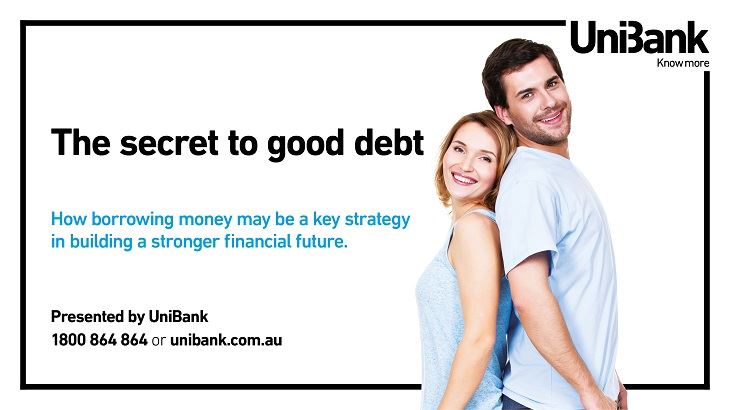
It may seem like an oxymoron - however borrowing money may be a key strategy in building a stronger financial future.
While living in the black means your bank accounts are never diminished with debit interest - there is a role that debt plays as we progress through our lives and careers.
Like most Australians, you probably have the dream of one day buying your own home…. which invariably comes hand-in-hand with a mortgage. In today’s market it’s not enough to simply ensure you are able to demonstrate a regular savings commitment to reach a required deposit.
Key to securing the best finance deal is a good credit history - which is built over time and reflects your financial behaviour in meeting bill and loan payments.
Most recent figures show that Australians are burdened by more than $2 trillion in household debt - with the average household owing $250,000. However, research shows that most of this debt is categorised as “good debt.”
What is good debt?
Before whipping out the credit card for a shopping frenzy, first take stock of your needs versus your wants.
The rule of thumb is that good debt is a borrowing that helps you access or leverage financial value or longer term income. For instance, a student loan finances your education which will present longer term professional and higher income opportunities.
Given that student loan repayments are directed through the Australian taxation system, they are not reflected in your credit history. There are however other options you may consider, such as borrowing for a vehicle or for investment.
For most Australians a car is an essential tool for you to reach your workplace destination - therefore helping you secure your income.
What is bad debt?
If your long term goal is to have the financial freedom to choose the life you want, smart decisions about the debt you take on are critical. Bad debt diminishes your financial position over time and is usually not attached to an asset that appreciates in value over time.
Before collecting a deck of credit cards and buying against the full balance available be aware that it is all too easy for the interest payments to cut deeply into your weekly budget. The automation of credit transactions through subscriptions, direct debits and memberships means it’s more important than ever before to keep track of purchases and the outstanding balance you hold each month.
Think carefully before taking on debt and ensure you position yourself for financial success. This all begins with a realistic budget you can stick with.
Bad debt may include taking on debt to buy clothes, gadgets, entertainment, nights out and holidays. Before each purchase ask yourself how it will build your financial future. For instance there’s no sense putting the purchase of a new outfit on your credit card, if you can’t afford to pay for the night out in cash.
Manage your debt and create wealth
Borrowing to build wealth is a solid strategy when you plan well and use the approach to build your credit rating and access purchases that will add to your asset pool.
In some cases - depending on your tax rate - there may be additional benefits in borrowing for property and share market investment - known as gearing. When calculating the overall implications of this strategy, consider the possible tax deductions, interest rate, income risk, fees and charges and the flexibility of the investment should you need to exit.
ASIC nominates 5 steps towards financial security, beginning with having a full picture of your financial starting point. When entering into the lending market, it’s not only important to borrow within your means, but towards something that will add value to your life.
Before committing, make sure to always seek professional advice and to research your lending options - what are the market interest rates, the different terms and conditions, penalties, fees and charges?
Most importantly, borrow to succeed in ways that meet your needs into the longer term.
UniBank is a division of Teachers Mutual Bank Limited ABN 30 087 650 459 AFSL/Australian Credit Licence 238981. Membership eligibility applies to join the Bank. Membership is open to citizens or permanent residents of Australia who are current or retired employees, students and graduates of Australian universities or family members of members of the Bank.
This article provided by an external writer. Tracie Sanim is a former finance editor and senior journalist with News Corporation. With a communication career spanning three decades in private industry, the not for profit sector and all three tiers of government, Tracie holds qualifications across journalism, project management, business management, innovation and entrepreneurship and business research. She is the founder of the award winning agency Splash Marketing and PR - a venture that focuses on strategic communication, business innovation and market engagement.
